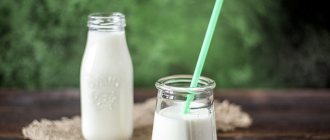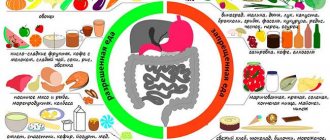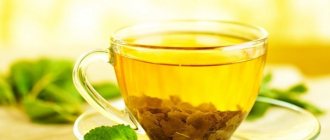Gastritis is a very common pathology, forcing many patients to severely limit themselves in nutrition. However, spicy, fatty, salty dishes are taboo not only for gastritis, but also for other gastrointestinal diseases. And yet, those who suffer from inflammatory processes in the gastric mucosa are very interested in the question, is it possible to consume milk with this disease? The answer is not obvious to many: both cow’s and goat’s milk for gastritis are a product that seems to be useful, but on the other hand, it is recommended to use it with caution.
Goat milk should be consumed with caution for gastritis
Let's try to figure this out.
Is it possible or not?
Gastritis with high acidity is accompanied by symptoms such as pain in the epigastric region, vomiting, nausea, belching with a sour taste, and burning in the chest. As a rule, the doctor prescribes treatment that is aimed not only at eliminating the inflammatory process, but also at reducing the concentration of hydrochloric acid in the gastric juice. When determining the method of therapy, special attention is paid to the patient’s diet. The specialist should give recommendations regarding nutrition.
Fermented milk products for gastritis with high acidity can be consumed in limited quantities. However, this must be done with extreme caution. Each fermented milk product has its own contraindications and indications. Therefore, when preparing a diet for a patient with gastritis, the individual characteristics of the body and the stage of the disease are taken into account.
Other types
Some people advise people with low stomach acidity to replace cow's milk with goat's milk. Goat's milk is a dietary food product: it is easily digestible, digests faster than cow's milk, contains less lactoglobulins and is a hypoallergenic product.
Another advantage of goat milk is its low lactose content, so this product can be indicated for people with lactase deficiency - a type of fermentopathy in which the body produces insufficient amounts of enzymes that break down milk sugar molecules (lactase).
You can drink goat's milk for any type of gastritis, but if the secretion of hydrochloric acid is reduced, you can include it in the diet no more than 2-3 times a week due to the increased content of lysozyme, which has antacid properties.
Soy
This is milk that is obtained from plant materials, mainly soybeans. It is rich in vitamins, mineral salts, bactericidal enzymes, amino acids necessary for the proper functioning of the brain, heart and blood vessels.
Soy milk contains little fat and is suitable for therapeutic nutrition for people with any form of gastritis, including those complicated by peptic ulcers, colitis, chronic enteritis and other pathologies of the digestive tract.
For diseases of the gastrointestinal tract, in particular gastritis, drinking many types of teas is not recommended. Of course, doctors do not impose an absolute ban, but they suggest that patients follow some recommendations:
- drink no more than two glasses a day;
- drink the drink slightly cooled to avoid additional irritation of the mucous membrane;
- the strength of the brew should be minimal;
- You cannot drink tea on an empty stomach.
The best solution: alternating green/black tea with herbal infusions.
Black tea
The question of whether or not to drink black tea for gastritis depends on the acidity of gastric juice. In case of hyperacid inflammation of the gastric mucosa, the drink is completely contraindicated. It promotes more active production of hydrochloric acid, which causes deterioration of the condition and increased pathological symptoms.
In case of hypoacid inflammation, completely black tea is not prohibited, but doctors strongly recommend reducing its consumption. If it turns out to be too strong, then you can dilute it with boiled and cooled milk. You can add a slice of lemon to the drink. It is left for a couple of minutes and then removed. You are allowed to drink it only in the morning.
Is it possible to drink black tea with milk if you have gastritis? Yes. It neutralizes high acidity. The recipe will be as follows:
- Place the product in the teapot at the rate of 1 tsp. per cup. Fill with hot water. It should not boil, as boiling water will destroy all useful components.
- Leave for 30 minutes.
- Then add milk to it at a ratio of 1:1.
Drink warm.
Green tea
Is it possible to have green tea for gastritis? Yes, but only during the period of remission. At this time, it will be especially useful because it contains a large amount of vitamins and microelements. They promote healing of damaged mucous membranes. The cooking recipe will be as follows:
- 3 tbsp. pour into a teapot and fill with hot, but not boiling, water.
- Leave to infuse for 30 minutes.
- Then place the kettle in a water bath for another 30 minutes.
Cool the resulting composition to a comfortable temperature and drink 2 tsp. every 2 hours.
Is it possible to drink tea made from dried tea leaves? Yes, it can be brewed up to three times. This does not deprive him of his qualities. Abuse of the drink can lead to the development of unpleasant side symptoms:
- tachycardia;
- development of angina attacks (retrosternal pain caused by insufficient blood supply to the myocardium);
- increased irritability, uncontrollable nervousness.
Herb tea
Herbal tea for gastritis can be used as an additional method of treating the disease:
- Chamomile. Widely used to treat stomach inflammation and ulcerative pathologies. The plant has anti-inflammatory, antibacterial and analgesic properties. Chamomile has proven itself well in the hyperacid form. To prepare the infusion, you need to brew 1 tbsp in 200 ml of boiling water. dry color.
- Mint. Facilitates the pathological symptoms of the disease. Particularly effective for erosive gastritis. 2 tbsp. peppermint must be poured into 200 ml of boiling water. Leave for 10 minutes.
- Lavender. Improves bile secretion, relieves pain. To prepare the infusion, brew 1 tsp in 170 ml of boiling water. crushed lavender leaves. Leave for 10 minutes.
- Ginger. Helps with nausea, relieves symptoms of inflammation. Stimulates the production of saliva, bile, and gastric juice, which improves digestion processes. The drink is prepared as follows: a piece of fresh ginger root is poured with boiling water and infused for 10 minutes.
- Thyme. The plant is known for its antimicrobial properties. Helps the stomach cope with infection caused by Helicobacter pylori bacteria.
- Licorice. The root of the plant is also effective against gastritis caused by the presence of Pylori. Helps well with scarring of ulcers.
- Haritaki. The herb has antibacterial and antifungal properties. It has a good effect on the condition of the entire digestive tract. Particularly useful for erosive and ulcerative forms of the disease. Effective against Helicobacter pylori bacteria. Sold in powder form, which is used for brewing.
The average course of herbal treatment is two to three weeks, drinking one to two cups per day. Then you need to take a break and, if necessary, repeat the reception.
Benefits of cottage cheese
It is often recommended to use cottage cheese for gastritis with high acidity. This product is quickly and easily absorbed. However, there are some limitations here too. For gastritis, you should eat low-fat fresh cottage cheese, without nuts, salt and various preservatives.
A homemade product is ideal. It is dietary, soft and tender. This cottage cheese can be consumed pureed. You can also use it to make soufflés or puddings, casseroles and dumplings.
This product should be used for gastritis three days after the onset of exacerbation. You should not use fatty, sour cottage cheese with all kinds of additives for cooking.
Treatment with goat milk
In folk medicine, there are many recipes for treating gastritis with milk. In combination with honey, this product provides quick and effective elimination of symptoms of the disease and relief from exacerbation.
For a three-week course of treatment, daily consumption of 1 glass of milk with two tablespoons of honey is enough. Therapy can be carried out in the absence of individual intolerance to the components of the drink.
Some patients note that cow's milk causes them to develop bloating, flatulence, and nausea. This is due to enzymatic deficiency in the body: protein is not completely digested and affects the functioning of the digestive system. Then goat milk comes to the rescue - a product with high energy value, which is almost completely absorbed in the gastrointestinal tract.
Treatment with goat milk consists of drinking 1 glass in the morning and before bed: you need to drink in small sips. It is recommended to start with half a glass of goat milk in the morning, gradually increasing the dose to two glasses per day.
In general, milk is a tasty and healthy product that can help relieve the unpleasant symptoms of gastritis. Together with diet and comprehensive medication therapy, it will quickly eliminate pain, heartburn and lead to recovery.
Gastritis is an inflammation of the inner surface of the stomach, due to which the disease imposes certain restrictions on the patient’s diet. If alcohol and caffeinated drinks are completely prohibited, then tea for gastritis of the stomach is allowed. Although there are some nuances.
Should you eat cheese?
What kind of fermented milk products can you use for gastritis? The list of them is not so long. Cheese with high acidity is allowed to be consumed. It must be of a solid variety without additives. You can introduce such a product into your diet only a week after the onset of an exacerbation of the disease.
What cheeses should you avoid? A list of fermented milk products of this type that are prohibited for gastritis is given below:
- processed cheeses;
- product with seasonings and pepper;
- cheese that is too salty or sour;
- spicy varieties;
- smoked, sausage cheese;
- goat cheese;
- feta cheese;
- Suluguni.
When tea is contraindicated
A strongly brewed drink - black or green - has no benefits for the body. Herbal infusions can provoke allergic reactions. That is why you need to start taking them in small portions, monitoring the reaction. Contraindications to drinking any type of tea are:
- period of exacerbation of diseases;
- pregnancy and breastfeeding - many herbs are prohibited for a woman at this time, as they can have a negative effect on the child.
It is not prohibited to drink teas for gastritis, but it is necessary to take into account the type of disease. When consuming herbal infusions, you need to take into account the fact that they can influence acidity levels: some increase them, others decrease them. A leading gastroenterologist will help you choose herbs, based on the characteristics of the disease.
What types of cheese are good for gastritis?
Not all fermented milk products are allowed for gastritis. With this disease, you can eat unleavened fresh varieties of cheese. These include mozzarella, mascarpone, and ricotta. Blue cheeses are also not prohibited. However, when purchasing such a product, you should make sure that it is not expired. It is worth noting that the so-called blue cheese has an astringent property. It helps strengthen the protective layer of the stomach.
When introducing cheese into your diet, do not forget about the restrictions. You can consume only a few slices per day.
Should you drink yogurt?
Is yogurt allowed for gastritis? This drink is quite popular. It is easy to prepare and has a pleasant taste. Patients with high acidity should use this product with caution.
Of course, curdled milk has many beneficial properties. However, it is worth limiting the consumption of this fermented milk product for gastritis in the acute phase, as there is a risk of aggravating the patient’s condition.
When an attack is stopped, yogurt can be very useful. However, it must be prepared from low-fat milk. Curdled milk should be non-acidic and fresh. Such a product will help get rid of constipation, prevent the deposition of large amounts of cholesterol, stabilize the functioning of the gastrointestinal tract, improve the patient’s condition with bacteriosis, and also normalize fat metabolism in the body.
Effect on the gastrointestinal tract
We will talk about the beneficial and harmful properties of the product.
Is it possible to drink milk if you have gastritis? Milk has a softening effect on the mucous membrane. For stomach pain, doctors recommend drinking 200 ml of the drink to get rid of cramps. Due to the low acidity of the drink, high acidity can be normalized. Also, for gastritis, it is very useful to regularly consume home-made fermented milk products. Milk with propolis at night will help you fall asleep quickly and relieve night pain.
Casein, which is part of milk, is difficult to digest. Every year, the human body is less able to digest casein. With age, the proteinase enzyme is lost, which causes difficulty in digesting milk. For older people suffering from gastritis, milk will do more harm than good. That is why it is best to give up a glass of milk and eat, for example, a little cottage cheese with the addition of propolis.

Yogurts for gastritis
Such fermented milk products are allowed for gastritis. However, when using them you should adhere to certain rules:
- The product should be consumed in small portions. Don't drink too much at one time. It is better to use two spoons, but often.
- Yogurt should be low-fat, approximately 2-2.5%.
- The product must be non-acidic and fresh.
The most useful is considered to be yogurt prepared at home and having a natural composition. The industrial product contains coloring and flavoring substances, stabilizers and preservatives that can cause harm to the body.
High-quality yogurt does not irritate the gastric mucosa. On the contrary, it reduces acidity and envelops.
The importance of diet
Gastritis accompanies the inflammatory process in the gastric mucosa. Digestive juice begins to be produced incorrectly, as a result of which acidity can increase or decrease. If treatment is not treated in a timely manner, serious complications are possible - stomach ulcers, intestinal inflammation, abnormalities in the functioning of the liver, gallbladder, pancreas, etc.
We recommend reading: The most effective methods of treating the liver with folk remedies, how to treat cancer, obesity and liver cysts
Very important! Savina G.: “I can recommend only one remedy for the quick treatment of ulcers and gastritis” read more.
The main symptom of gastritis is pain in the upper abdomen. You may also experience heartburn, belching, nausea and vomiting. This reaction of the body is typical when the stomach is empty. Symptoms appear due to the fact that digestive juice irritates the walls of the organ. The occurrence of pain and other undesirable sensations that appear after eating is often associated with the use of foods that irritate the gastric mucosa. Therefore, with gastritis, the main thing is to follow a diet.
Is it possible to have kefir for gastritis?
This is another common fermented milk product. However, many are afraid to use it for gastritis. For high acidity, kefir is recommended, the fat content of which is from 2 to 3%. The product must be fresh, maximum 2 days old. Only this kind of kefir has an enveloping effect and normalizes intestinal motility. The main criterion for choosing a product is freshness.
Is it possible to have kefir for gastritis? Certainly. However, this product should be consumed in moderation, drinking small portions throughout the day. If you do not follow the rules, you can provoke intestinal upset and diarrhea.
Condensed milk for stomach diseases
Is it possible to eat condensed milk if you have gastritis? Experts have different opinions. Condensed milk is heat-treated milk that retains a large amount of proteins and microelements, but loses some vitamins. It most often contains preservatives, thickeners and other additives. And although the label says that the product is made from natural milk, many manufacturers manage to replace this valuable product with additives.
Such products can cause stomach upset or provoke an exacerbation of the disease in people suffering from gastritis.
Therefore, you can include condensed milk in your diet only if you are confident in the quality of the product. It should be consumed in moderation.
What should kefir be like?
During the period of exacerbation of gastritis, it is worth giving up fermented milk products for 4 days. This will avoid many problems.
For gastritis, patients with high acidity are not recommended to consume kefir that is too cold. The temperature of the drink should be room temperature. Do not heat it in the microwave or on the stove. As a result, it will become more acidic. It is better to place the cup of drink on the table and leave it for half an hour. This time will be enough.
To give kefir an original taste, you can add sweet fruits or natural honey to it.
Sour cream and gastritis
Industrially produced sour cream is not recommended for use for gastritis with high acidity, even if it is positioned as dietary. There are restrictions for the home product as well. Sour cream should not be greasy. When using such substances, there is an additional burden on the biliary system and the liver.
Homemade low-fat sour cream can be added to other dishes. It is not recommended to consume more than 15 grams of product at a time. For gastritis, sour cream is allowed only during the period of remission.
What are the benefits of sour cream?
This fermented milk product ensures stable and proper functioning of the intestines. Sour cream contains many vitamins, including PP, E, A, B vitamins and ascorbic acid. The product is also rich in microelements: manganese, copper, iodine, fluorine, iron, zinc. In addition, it is saturated with fatty acids, β-carotene, natural carbohydrates, and animal proteins.
Sour cream helps improve brain performance, stabilize metabolic processes, and facilitate muscle function. You should not completely abandon this fermented milk product, as well as the others.











